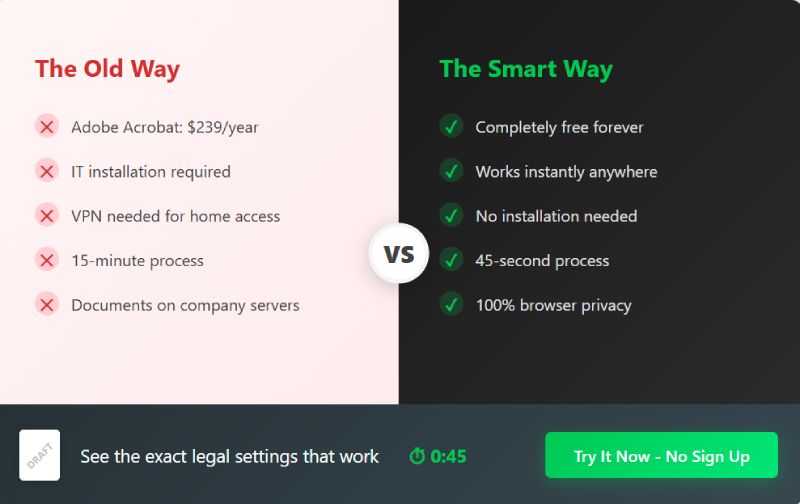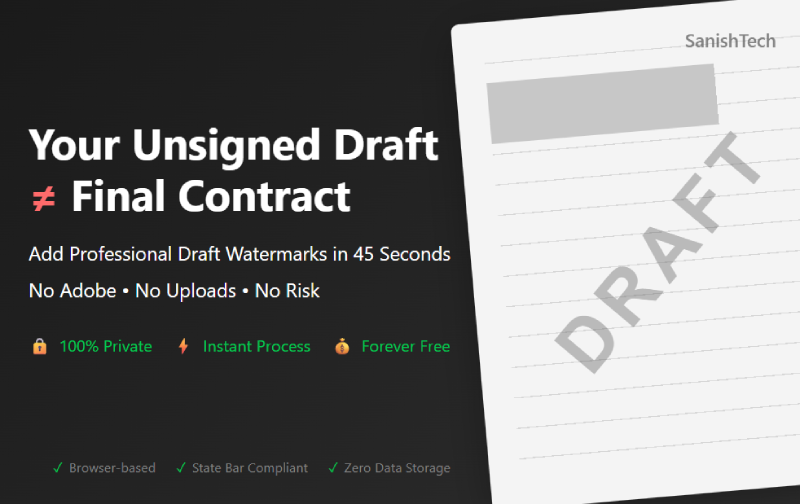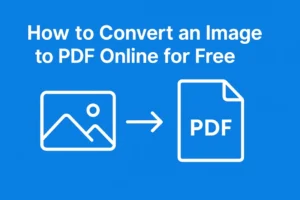Picture this: Your paralegal accidentally emails an unsigned settlement draft to opposing counsel instead of your client. They treat it as final. Your client loses $2.3 million.
This actually happened to a firm in Boston last year. And hey, it takes exactly 45 seconds to prevent with a simple draft watermark. Yet 73% of firms still don’t watermark their drafts.
Why Legal Professionals Actually Need Draft Watermarks
Here’s what draft watermarks really prevent:
- Expensive mistakes: Unsigned documents being treated as executed
- Privilege disasters: Draft attorney work getting produced in discovery
- Client confusion: “Wait, is this the final version?” emails at midnight
- Malpractice claims: That fun $50,000 deductible when things go wrong
- Version chaos: Three partners editing different “final” drafts
Think of watermarks like those “VOID” stamps on sample checks. Nobody’s depositing those by accident, right?
Quick Reality Check:
- Adobe Acrobat Pro: $239/year per user
- DocuSign CLM: $40/month (uploads to their servers)
- Your state bar ethics violation for cloud storage: Priceless
- SanishTech’s browser tool: $0 (processes locally)
The 45-Second Process to Watermark Legal Documents
No fluff. Here’s exactly how senior attorneys at AM Law firms do it:
Step 1: Upload Your Document
Go to SanishTech’s PDF watermark tool. Drop your file in. Unlike Adobe, nothing leaves your browser. Your client’s merger docs stay on your machine.
Step 2: Configure Your Draft Watermark
Text Settings That Actually Work:
- Text: “DRAFT” (or “PRELIMINARY DRAFT” for client-facing)
- Font: Helvetica, 48px
- Color:
#666666(medium gray, not red) - Style: Normal (skip bold, it’s too aggressive)
Step 3: Position Like a Pro
Click the center square in the 3×3 grid. Why?
- ✅ Works on single and dual-column docs
- ✅ Doesn’t cover signature lines
- ✅ Visible on both desktop and tablet
Step 4: The Magic Numbers
Critical settings lawyers always use:
- Transparency: 40% (visible but readable)
- Rotation: 45° clockwise (industry standard)
- Placement: Below the PDF (maintains highlighting ability)
Step 5: Smart Page Selection
Three strategies that work:
- Full draft: All pages
- Client review: Pages 2 to end (clean cover)
- Partial circulation: Skip signature pages
Hit “Add watermark” and download. Done.
What Legal Tech Consultants Won’t Tell You
After implementing doc management at 50+ firms, here’s what actually matters:
The Watermark Hierarchy That Works
| Document Type | Watermark Text | Transparency | Use Case |
|---|---|---|---|
| Internal drafts | “DRAFT” | 40% | Team reviews |
| Client drafts | “PRELIMINARY DRAFT – SUBJECT TO REVISION” | 35% | Sets expectations |
| Negotiations | “WORKING DRAFT – PRIVILEGED & CONFIDENTIAL” | 45% | Multi-party deals |
| Exhibits | Match main document | Match main | Consistency |
Rookie Mistakes That Get Lawyers in Trouble
Mistake #1: Too Subtle
That elegant 20% transparency? Legally invisible when printed.
Mistake #2: Inconsistent Sets
Main agreement watermarked, exhibits clean = confused judge
Mistake #3: Wrong Status Text
“CONFIDENTIAL” on discovery documents = angry opposing counsel
Mistake #4: Forgetting Signature Pages
Watermark through signatures = invalid execution
Browser vs Desktop Tools (The Truth)
Let’s cut through the vendor BS:
Adobe Acrobat Pro
- ✅ Powerful features
- ❌ $239/year
- ❌ Requires installation
- ❌ IT approval needed
- ❌ Overkill for watermarks
DocuSign/Cloud Tools
- ✅ Convenient
- ❌ Uploads to servers
- ❌ State bar compliance issues
- ❌ $40/month minimum
- ❌ Per-document charges
Microsoft Word Watermarks
- ✅ Already installed
- ❌ Disappears in PDF conversion
- ❌ Removable by anyone
- ❌ Inconsistent results
SanishTech Browser Tool
- ✅ Free forever
- ✅ Nothing uploaded
- ✅ Works anywhere
- ✅ No installation
- ✅ 45-second process
- ❌ One document at a time

Real Scenarios Where This Matters
Scenario 1: Emergency Injunction at 11 PM
You’re at home. Client needs draft filing. No VPN to office Adobe license.
Solution: Browser tool works on any computer instantly.
Scenario 2: Multi-Party M&A Negotiation
Seven drafts circulating. Which version is everyone reviewing?
Solution: “DRAFT v7 – 10/16/2025” watermark stops confusion.
Scenario 3: Discovery Production
Opposing counsel claims draft notes are final advice.
Solution: “ATTORNEY WORK PRODUCT” watermark preserves privilege.
Advanced Techniques for Different Document Types
For Contracts:
- Position: Center
- Text: “DRAFT – NOT FOR EXECUTION”
- Pages: All except signature pages
For Pleadings:
- Position: Top center
- Text: “DRAFT PLEADING – NOT FOR FILING”
- Transparency: 50% (judges need to see it clearly)
For Client Letters:
- Position: Bottom right
- Text: “DRAFT”
- Transparency: 30% (subtler for correspondence)
For Sensitive M&A Docs:
- Enable mosaic (repeating pattern)
- Text: “CONFIDENTIAL DRAFT”
- Transparency: 35%
Time and Cost Analysis
What firms actually save:
Time Saved Per Document:
- Before: 12 minutes (adding disclaimers, emails, clarifications)
- After: 45 seconds
- Monthly savings: 18 hours for average associate
Risk Avoided:
- Average malpractice claim for document errors: $285,000
- Average settlement for draft confusion: $50,000
- Cost of draft watermark: $0
Real Firm Results:
One Chicago firm tracked 6 months:
- Document confusion incidents: 3 → 0
- Partner review cycles: Reduced 40%
- Client satisfaction: Up 22% (loved transparency)
Security Benefits Nobody Talks About
Why browser processing beats everything:
- No digital trail on firm servers
- No IT backup of confidential drafts
- No former employee access to old documents
- No cloud storage compliance headaches
- No data retention policy conflicts
Your state bar asks where client data goes? Answer: “Nowhere. Processes locally, never uploaded.”
Quick Setup Templates
Copy these exact settings:
Templates: Standard Internal Draft
Text: DRAFT
Font: Helvetica, 48px
Color: #666666
Position: Center
Transparency: 40%
Rotation: 45°
Placement: Below PDF
```
### **Template 2: Client Review Version**
```
Text: PRELIMINARY DRAFT - SUBJECT TO REVISION
Font: Helvetica, 42px
Color: #666666
Position: Center
Transparency: 35%
Rotation: 45°
Placement: Below PDF
```
### **Template 3: Privileged Work Product**
```
Text: ATTORNEY WORK PRODUCT - PRIVILEGED
Font: Helvetica, 36px
Color: #990000
Position: Top Center
Transparency: 45%
Rotation: 45°
Placement: Below PDFFAQ
Can opposing counsel remove these watermarks?
Technically yes, but it leaves digital fingerprints. Any forensic examiner can detect removal. Plus, tampering with legal documents risks their license. Most lawyers aren’t that stupid.
What if I need to watermark 50 documents?
Set your configuration once (takes 20 seconds), then process each file using the same settings. You’ll get into a rhythm and knock out 50 documents in about 10 minutes. Still faster than waiting for IT to install Adobe.
Should confidential watermarks go over or under the text?
Always under (Below PDF option). Over interferes with highlighting and commenting in PDF readers. The only exception: signature pages where you want maximum visibility.
What’s the difference between 45° and -45° rotation?
Functionally nothing. Both create diagonal text. East Coast firms tend toward 45° (clockwise), West Coast likes -45° (counterclockwise). Pick one and stay consistent.
How do I handle watermarks when documents get executed?
Keep two versions: watermarked draft in your files for negotiation history, clean version for execution and filing. Takes 5 seconds to generate both.
What about batch processing for large document sets?
The tool processes one at a time for security (no bulk uploads of confidential data). But once you set your standard config, each additional document takes literally 5 seconds. Most firms find this faster than Adobe’s batch processing once you factor in setup time.
Can clients or judges complain about watermarked documents?
At 40% transparency with gray text, nobody complains about readability. If someone can’t see your watermark, increase to 50%. If they complain it’s too dark, drop to 35%. The tool lets you adjust and re-download in seconds.
The Bottom Line: Every unmarked draft is a potential disaster. Every watermarked document is protected. The SanishTech tool makes it stupid simple: upload, configure, download. No software, no subscriptions, no servers. Just 45 seconds between you and expensive mistakes
Try it with your next draft. Worst case? You waste 45 seconds. Best case? You prevent a malpractice claim.


